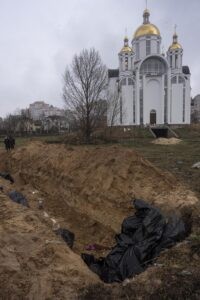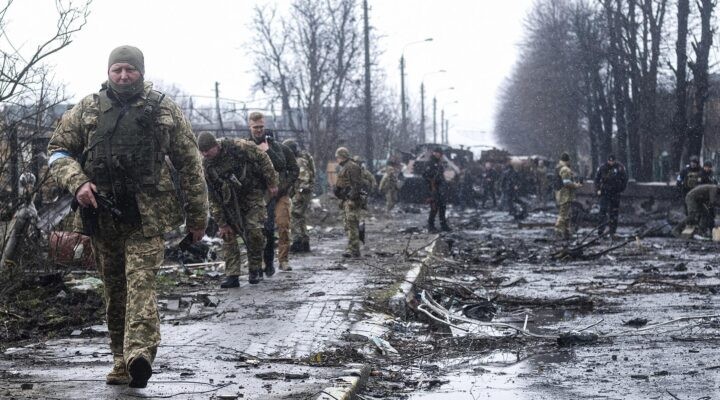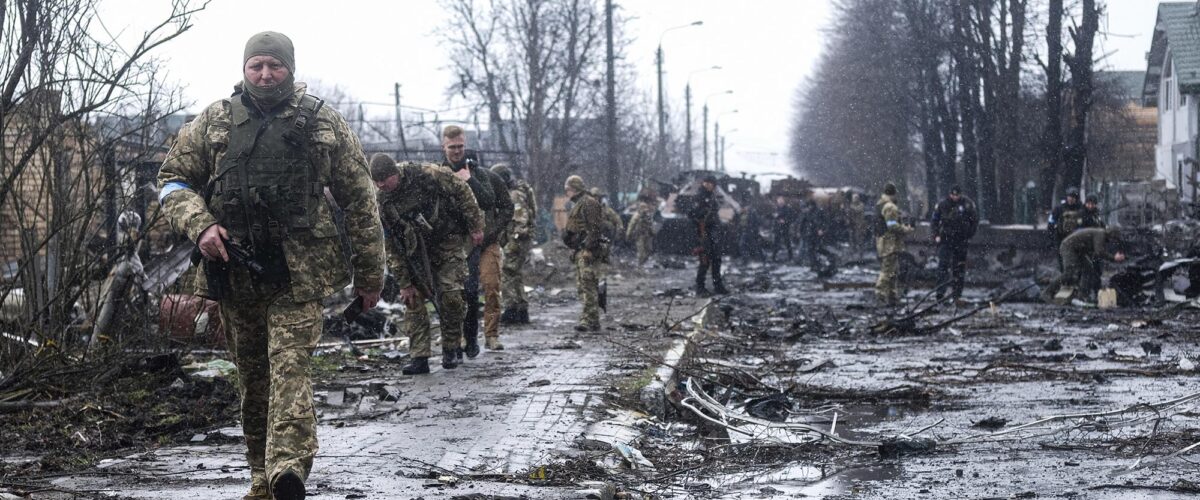The dean of the Slavic Evangelical Seminary in Kyiv, Ukraine, was among those shot dead by invading Russian troops, according to multiple social media reports.
 Vitaliy Vinogradov was a graduate of the Kyiv Bible Institute and Evangel Theological Seminary. His body was found on a street in Bucha, which is part of suburban Kyiv.
Vitaliy Vinogradov was a graduate of the Kyiv Bible Institute and Evangel Theological Seminary. His body was found on a street in Bucha, which is part of suburban Kyiv.
As Russian troops have begun repositioning and abandoning areas outside Kyiv, hundreds of bodies are being discovered, some buried in makeshift graves and some left littering streets and yards.
One of those mass graves is located in the yard of the Church of St. Andrew and Pyervozvannoho All Saints in Bucha.
Survivors and those now coming to the aid of survivors describe the surreal scenes as hellish and unbelievable and as clear evidence of international war crimes by Vladimir Putin and his troops.
NATO’s secretary general described the scene in Bucha as “brutality against civilians we haven’t seen in Europe for decades.”
News of these grim discoveries over the weekend surely added to the death toll reported by the United Nations High Commissioner for Human Rights on March 29. At that time, UNHCHR reported 1,189 civilian casualties. Based only on preliminary reporting throughout the weekend, that number easily could double.
The United Nations Office for the Coordination of Humanitarian Affairs reports that almost 10.5 million people have been forcibly displaced within Ukraine and neighboring countries since Feb. 24. That includes more than 4 million people who have fled Ukraine altogether — mainly women, children and the elderly.

People gather next to a mass grave in Bucha, on the outskirts of Kyiv, Ukraine, Sunday, April 3, 2022. Ukrainian troops are finding brutalized bodies and widespread destruction in the suburbs of Kyiv, sparking new calls for a war crimes investigation and sanctions against Russia. (AP Photo/Rodrigo Abd)
Poland alone has received more than 2.3 million refugees, followed 616,000 in Romania, 388,000 in Moldova and 368,000 in Hungary.
For perspective, imagine every resident of the city of Houston moving to a country the land size of New Mexico with an existing population the size of California. That’s what has happened in Poland.
Russian bombs will not deter Baptist humanitarian relief efforts, according to a report from the European Baptist Federation.
“For several days, the city of Chernihiv in northern Ukraine has been cut off from the rest of the country. On March 23, Russian troops bombed a bridge in the city that was an important humanitarian corridor. Access to aid is difficult and it is impossible to leave the city. However, local Christians are finding alternative means of transport, such as boats, to take food into Chernihiv,” the EBF explained in its April 1 situation report.
“The city of Mariupol continues to experience a humanitarian catastrophe, with constant shelling and blocks to humanitarian aid. According to the city’s mayor, there are more than 100,000 civilians waiting to be evacuated. Bethany Baptist Church in the city was recently bombed. Despite the brutal conflict, believers in Ukraine continue to meet together to pray, worship and read the Bible. Churches across the country are working together to provide accommodation, food, clothing, medicine and transport.”
Likewise, although the shelves of most shops and supermarkets in Sumy, a city in northeastern Ukraine, are now empty, churches in other areas of Ukraine and abroad “are sending food into the city every day, and local Christians help distribute it to those in need,” the EBF reported.
Further, “Baptist churches in the Cherkasy region are delivering food to badly hit areas. On the way back, drivers take people out of the war zone, and a team of volunteers help them travel to other European countries.
“A youth leader and evangelist from a church in Mykolaiv has started a ministry to local soldiers. Every morning he takes tea and small gifts to encourage troops at 15 checkpoints. The soldiers willingly agreed for him to pray with them and asked him to continue his visits.”
EBF reported 18,000 displaced children in the Chernivtsi region. “Children from local Christian families are donating their toys to help them settle into their new surroundings,” the report said.
Within the borders of Ukraine, Baptist churches have created sleeping accommodations for 45,000 people every night.
Beyond Ukraine’s borders, Baptists are doing likewise, with 4,000 beds available for Ukrainian refugees in Romania, 1,600 beds in Poland, and 700 beds in Moldova.
In Hungary, Baptists are serving the oft-persecuted Roma people who have fled Ukraine. “Many churches and other organizations turned Roma people away as they fled the border, but the Hungarian Baptists are serving those in need, regardless of background,” the EBF reported.
A Cooperative Baptist Fellowship-affiliated ministry now known as the Ruth Refugee Center in Bucharest, has continued to adapt to current needs.
And in Romania, a Cooperative Baptist Fellowship-affiliated ministry now known as the Ruth Refugee Center in Bucharest, has continued to adapt to current needs.
“When the Ruth Refugee Center was established nearly a month ago, the vision was to provide a safe place for guests from Ukraine to sleep, launder their clothing, eat three meals a day, and receive support in resolving various problems with their embassy in Bucharest,” leaders explained to EBF. “After hosting guests for two weeks, it became apparent that for some families a quick transit was not an option. Over the past week and a half, the two apartments in the Ruth School have been renovated and furnished to host two or three families for longer periods of time. With these new facilities, our Ruth Refugee Center can now host up to 65 guests per night.”
CBF officials in Decatur, Ga., report that 975 individuals, churches, partners and state and regional organizations have given more than $400,000 to CBF’s Ukraine Relief Fund.
CBF field personnel in multiple locations are using those funds to provide safety, shelter and Christian love to refugees. In addition to a $25,000 gift to Project Ruth, those field personnel include Gennady and Mina Podgaisky, who have continued the ministry they have led in Ukraine even as they have been visiting in North Carolina since earlier this year, plus the work of Dianne and Shane McNary in Slovakia and Eddie Aldape, who normally serves in Spain but has temporarily relocated to Slovakia.
The McNarys received $30,000 from the CBF Ukraine Relief Fund for the purpose of purchasing a building nearby a local Roma congregation to serve as a central warehouse for collection and distribution of food and supplies such as bedding and clothing. The McNarys are working in close partnership with Slovak Baptists and have supported refugee responses in five Slovak Baptist congregations.
Related articles:
Baptists in countries bordering Ukraine open their doors to fleeing refugees
As Ukrainian Baptists continue to shelter and feed neighbors, a CBF ministry center is bombed
Ukraine’s just war | Opinion by David Gushee


